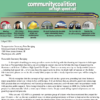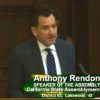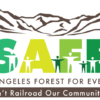Update June 30th: The bill passed in the Assembly as well and the Governor has signed the bill.
The State Senate gave the High-Speed Rail Authority a free pass to be less transparent with a bill that reduces their reporting requirements by 75% from semi-annually to once every two years. This was sent forward in a hurried manner since it was a budget trailer bill. In defense, Authority spokesperson Lisa Marie Alley told the Associated Press, “It’s not about being less transparent. It’s actually about being more efficient in our transparency. Streamlining them in this fashion is a win-win for everybody.” This explanation is laughable.
This is not a win for the public. The Legislature acts as our representatives. Hearings and legislative updates such as the ones being dumped by the Senate are for the benefit of the public. They were required to make sure the requirements of SB 1029 were carefully followed. That was the appropriations bill, which gave the Rail Authority $6 billion for the first small (and illegal) section in the Central Valley. The Senate may tire of reading these reports every 6 months but from the initial public outcry, it’s clear that the public has not.
The Senate Vote:
This recent vote reduces the amount of supervision over what’s touted to be one of the largest infrastructure projects in the state if not the country. A project riddled with problems, funding, environmental issues and lawsuits. This Senate action demonstrates California politics at its worst…showing once again that politics takes precedence over good judgment and ignores their fiduciary obligations to the voters.
So how did SB-76 (AB-95 -Assembly side) get passed so quickly? It began life in the January 2015 as a placeholder for monkey business later-meaning it was nearly blank. It was amended in March and included all kinds of things included such as salmon, forestry, tribal issues and it was labeled a water bill. No sign of high-speed rail in the bill. June 11th someone took a hatchet to the bill and excluded large portions of the March bill and assigned it to the transportation committee under Budget and Fiscal review as a trailer bill to the budget. Speedy action followed. This is called the gut and amend process or a spot bill and is specifically designed to push bills through without public debate. It’s a despicable practice that should be outlawed. The bill now goes before the Assembly. Let your representatives know you want them to vote no on this bill.
There were some Senators who stood up and objected to this action when it came up for a vote. Toward the end of this five-minute YouTube Senator Mark Leno, a Democrat from San Francisco asks for their Aye vote. He states that the High-Speed Rail Board discusses everything in public on a monthly basis including their finances, their hiring and firing and updates about the project. Leno states making this change was to increase efficiency, to create less onerous reporting.
Nothing could be further from the truth.
They rarely discuss finances at the regular board meetings. Instead these discussions are held separately, usually in an early morning finance committee meeting which makes it harder for people to access. The meetings are not live-streamed or audio or video recorded. And if the issues get too touchy, they have pushed the public out the door mid-meeting as they did in their March 10, 2015 committee meeting. They do produce financial reports but there is no explanation for abbreviations or terms to make them public friendly. It’s not held every month either. In June there was no finance committee meeting.
This bill, SB 76 should be amended immediately. For a project of this magnitude — the largest infrastructure project the U.S. that has ever attempted the public wants more transparency and accountability not less.
California’s track record on mega projects has not been good. Senator Mark DeSaulnier conducted a session called “Lessons Learned” after the Bay Bridge debacle went from $1.4 to $6.3 billion and wanted to explore what could be learned to avoid this from happening again. Reducing reporting was not among the action items.
If the Legislature doesn’t want to deal with the specifics of project which is on the verge of construction which is clearly outside their expertise, they should appoint a technical committee, perhaps even an outside source such as UC Berkeley Institute of Transportation Studies (ITS) who will study the rail project reports and report to the Legislature. After all ITS is the Senate’s organizational expert on Transportation issues created by the Legislature in 1948. Perhaps the Legislature would accept their recommendation and not ignore them as they did the Legislative Analyst’s recommendations that repeatedly pointed out the projects issues.
This independent committee would be in addition to the Peer Review Group. While they provide some valuable information they clearly have a stated goal to make the project happen, therefore they cannot be relied on for a completely unbiased analysis as ITS can. This bill also changes the requirements of the Peer Review group to allow for business experts of other types of infrastructure projects since it was difficult to find experts in high-speed rail.
Public Records Requests, another example of non-transparency:
Senator Leno, do you think this agency is transparent when they refuse to turn over documents requested by the public in any decent time frame? Key reports, project updates called Progress reports are done monthly by Regional Consultants for each section they manage. The Authority is now nearly one year behind in releasing these reports in response to public record by Californian’s Advocating Responsible Rail Design (CARRD). They say these reports are in draft, another ridiculous statement. Once they are submitted they should be final, not for the Authority to tamper with and ask for revisions. This process according to open meeting laws is supposed to take 10 days, especially for regular reports.
These reports are slowly released to keep the public guessing as to what’s really going on a current basis. This is a clear violation of the Open Meetings Act. Also the Rail Authority changed in report format in October 2012. Gone is the section called,” Key Issues and Areas of Concern “ or Programmatic concerns. Moving sensitive discussions instead to conference calls, which makes it impossible to know what’s going on.
CEO’s authority level promotes secrecy:
Recently it was disclosed by a Rail Authority representative that the CEO could move forward without any board approval with any request for proposal (RFP) in which fees are under $5 million. The public is prevented from knowing what’s going on and giving input at the initial start of the process.
Just recently the rail authority sent out an RFP for future consultants to write the content of the 2nd funding plan. This is a very important event because its key in proving project solvency and gaining accessibility to bond funds yet no discussion at the board level in public were held to discuss how this will move forward.
In fact, a truly independent group should have supervised this particular RFP since the winners will judge whether or not the project has been compliant with the requirements outlined in the bond measure. Something seems strange about having the Authority judge who that independent consultant will be. The bond measure says before the Authority can spend construction dollars for expenditure for construction and real property and equipment acquisition,
“a report or reports, prepared by one or more financial services firms, financial consulting firms, or other consultants, independent of any parties, other than the authority, involved in funding or constructing the high-speed train system, indicating that (A) construction of the corridor or usable segment thereof can be completed as proposed in the plan submitted pursuant to paragraph (1), (B) if so completed, the corridor or usable segment thereof would be suitable and ready for high-speed train operation, (C) upon completion, one or more passenger service providers can begin using the tracks or stations for passenger train service, (D) the planned passenger train service to be provided by the authority, or pursuant to its authority, will not require operating subsidy, and (E) an assessment of risk and the risk mitigation strategies proposed to be employed.”
So the CEO, Jeff Morales, Ex Parsons Brinckerhoff executive, supervises this RFP and when completed the results are usually presented to the board for their approval. The Authority has declared they have begun construction on a bridge in Fresno though they do not have this second funding plan signoff. Perhaps they feel justified in doing so since they aren’t using bond funds, they are using cap-and-trade funds. I wonder if the public understood that was a possibility when they signed off on the bond measure.
Parsons Brinckerhoff selected again:
And speaking of Parsons Brinckerhoff, there was lots of maneuvering at the board meeting on June 9th in Los Angeles to get a $700 million dollar contact approved with Parsons even if it meant that they had to call back Vice Chair Thea Selby, who was heading to the airport, to complete a quorum for the vote.
Why was it so important to drag a board member back from the airport? Why couldn’t they pass this agenda item in Sacramento at the next meeting?
Is this an example of transparency?
Perhaps nothing illegal was done here but clearly the board wanted to get on with the award at a busy meeting where the focus would not be on this subject. They wanted to minimize any questions. It was disclosed that the selection criteria was partially subjective and could have made the difference in a very tight race between Bechtel and Parsons Brinckerhoff but we’ll never know for sure.
By the way, the CEO, Jeff Morales left his position at PB, where he was managing the High-Speed Rail project for them and went directly to work for the Authority as their CEO. Previously he managed the Bay Bridge project for Caltrans and understated the costs of that project to the Legislature.
Longing for the champions of the past:
Where are the state senators like former Senators Joe Simitian, Mark DeSaulnier and Alan Lowenthal, who dogged the Rail Authority, who made them tow the line? These senators were instrumental in requiring this extra reporting as part of the funding bill, SB 1029. Why? Because it was needed. It still is needed even more now so since the Rail Authority is now buying, some might say stealing properties from the public. Properties that the Authority may never use. It doesn’t matter that the Authority has started to build a bridge in Fresno, it doesn’t matter that the Authority has spent a billion dollars. It matters what’s before them, which is an enormous amount of public funds some perhaps another $99 billion. With no other federal funds or private funds in sight, why start something that cannot be finished.
It’s a shame to bring politics into the decision but the Democratic Party control of California’s Legislature has offered the Authority cover and assistance to skirt those portions of its authorizing law it finds inconvenient. More than 13 bills have been introduced by Republican Assembly or Senate members concerning the Rail project. They were introduced to manage the project, allow another public vote, change or move remaining money to other worthy causes such as water or education. All were blocked in committee.
At least 3 audits were requested and turned down by the Audit committee. The state auditor, Elaine Howell, had the power on her own to go forth and do audits without committee sanction but she didn’t do it. She too is guilty of politics. The governor signs her paycheck.
Sacramento insiders say for the most part both Democrats and Republicans alike are not in favor of the project but since most believe it is sure to implode on it’s own. No one wants to champion its demise, an action sure to have political consequences. Perhaps this is the reason behind the change in reporting. It will allow the members to go about their business and not have this very controversial project surface publicly every 6 months.
These are your elected officials not acting in your best interest. Key decisions will be made in the next year and being out of the public eye would make this rogue agency even less accountable. More leadership not less is needed now.
Action is needed by the Legislature to pass another bill correcting this action or perhaps the Governor will wake up and do the right thing and veto this bill. We can dream.




